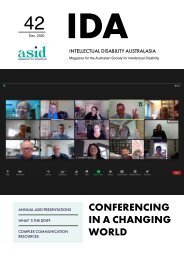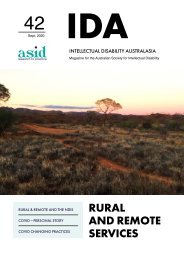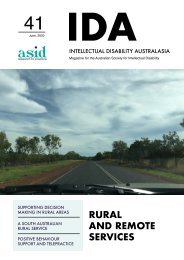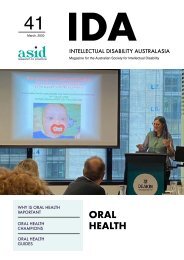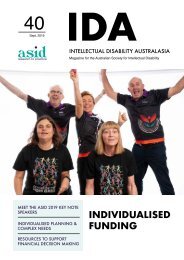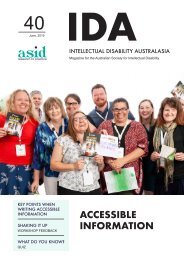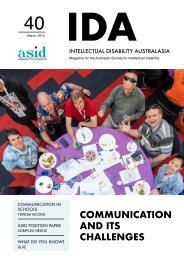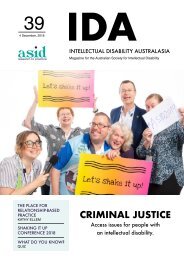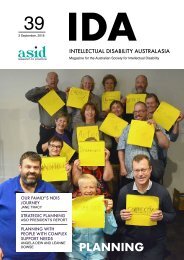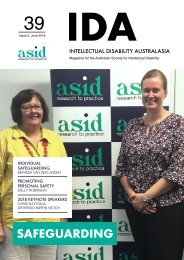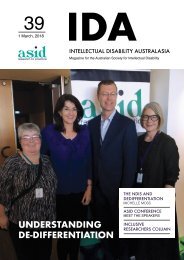IDA Vol 40 Issue 4 - ASID (Dec 2019)
Create successful ePaper yourself
Turn your PDF publications into a flip-book with our unique Google optimized e-Paper software.
END OF LIFE AND<br />
INTELLECTUAL DISABILITY<br />
Michelle Weiss<br />
Seminar held on Wednesday 26th June <strong>2019</strong>– Australasian Society for Intellectual Disability, Victoria<br />
It was a great pleasure to have Michelle Weiss as our guest for the <strong>ASID</strong> VIC Seminar on Wednesday<br />
26th June <strong>2019</strong> at Onemda. Dr Michelle Weiss is Senior Lecturer in Applied Psychology at Western<br />
Sydney University, Australia. Michelle is a psychologist and educator who has worked in the disability<br />
sector for over 30 years. Michelle provided an interactive seminar on the topic “End of life and<br />
intellectual disability”. The seminar focussed on why and how to support people with intellectual<br />
disability to talk about their end of life preferences.<br />
Michelle introduced us to a framework for understanding end-of-life care for people with intellectual<br />
disability. A pivotal aspect of this framework is the importance of developing a knowledge about dying<br />
throughout life. Michelle highlighted that opportunities to develop this knowledge is restricted for people<br />
with intellectual disability. This restricted knowledge impacts on the experiences people with intellectual<br />
disability have at the end of life.<br />
Michelle provided us with examples of how people with intellectual disability can participate in end<br />
of life decision-making with support by expressing their preferences regarding topics such as funeral<br />
arrangements, place of death, and palliative care. She facilitated an excellent discussion around the<br />
barriers to this participation, including avoidance and protection by caregivers.<br />
Michelle shared practical tips for those supporting people with intellectual disability to develop<br />
knowledge about death and dying. These included using language that is clear and direct, expanding<br />
the topic a bit more each time, and asking questions to check for understanding. Michelle directed<br />
the audience to “Talking End of Life (TEL)”, an online resource designed for disability support<br />
professionals about how to teach people with intellectual disability about end of life.<br />
To conclude the workshop, Michelle shared her experiences supporting people with intellectual<br />
disability in loss and grief by encouraging participation in collective mourning.<br />
In conclusion, Michelle shared some words of wisdom from a disability support worker:<br />
“It’s okay to talk about death… talking about it won’t make it happen any sooner.”<br />
For further information:<br />
https://www.westernsydney.edu.au/ssap/ssap/research/ongoing_research_projects/end_of_life_and_<br />
intellectual_disability<br />
Hille Voss (Netherlands Institute for Health Research)<br />
Dr Jo Watson (Deakin University)<br />
<strong>Vol</strong> <strong>40</strong>, <strong>Issue</strong> 4, <strong>Dec</strong>ember <strong>2019</strong><br />
11




